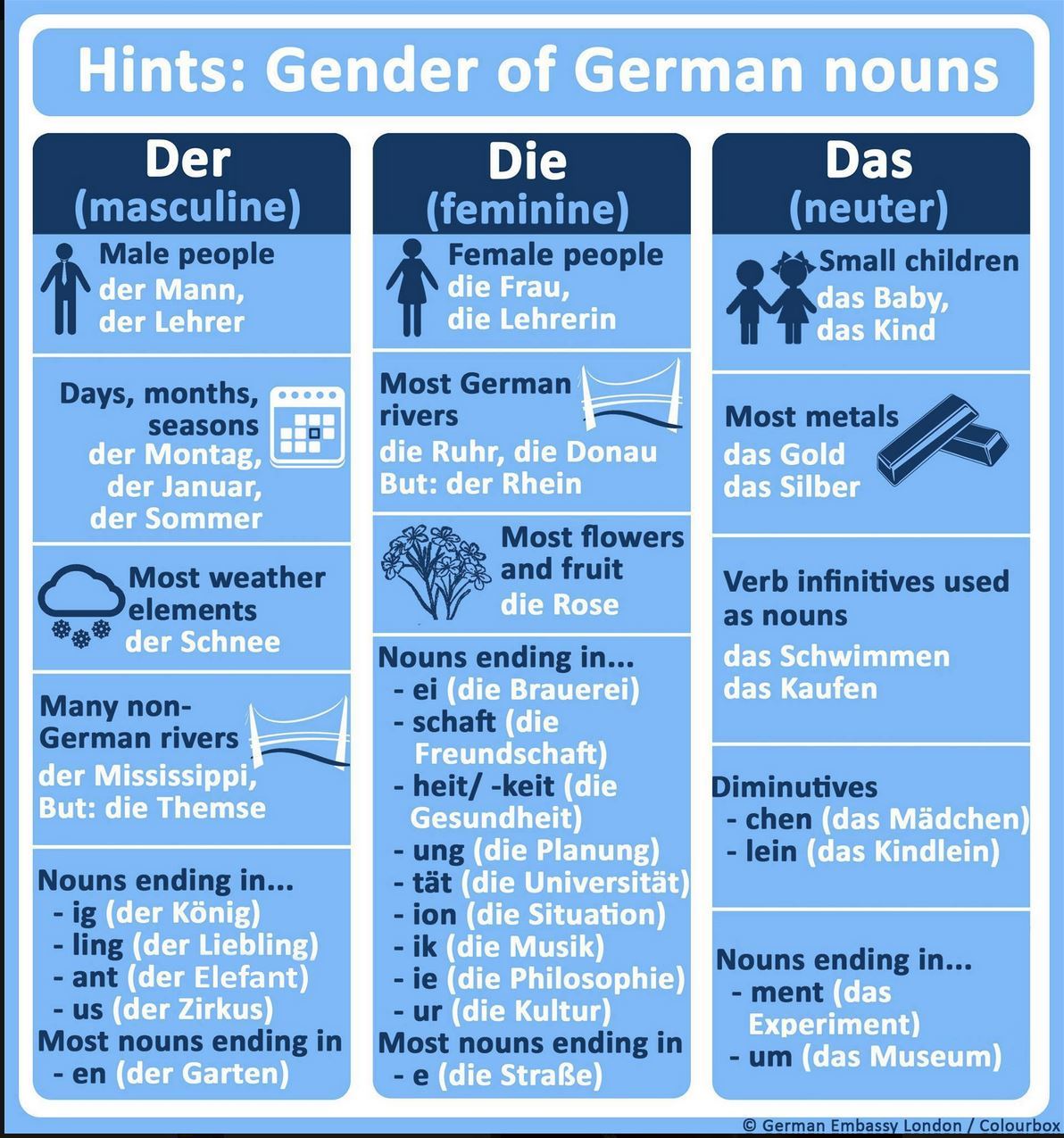In German Is Katze Masculine Or Feminine

German nouns & articles. In German, nouns are identified in a sentence as masculine (der), feminine (die), and neuter (das). The article is also identified for plural (die). This can be tricky for the native English speaker, since the articles "the" and "a" are not differentiated in English and adjectives do not decline.
In german is katze masculine or feminine. Feminine Adjective Endings First, let’s work with the same example as the masculine (‘this big dog’), but replace ‘dog’ with ‘cat’ (<– die Katze, feminine noun): nominative: diese große Katze accusative: diese große Katze dative: dieser großen Katze genitive: dieser großen Katze. Note: Nouns are words which represent people, animals and things (tree, cat, house) and even abstract things (like time, force or quantity).There are words that are often put in front of nouns: The articles, like “der Baum”, “die Katze” or “das Haus”.; The adjectives, like “der große Mann” or “die schöne Frau”.; The possessive pronouns, like “seine Hose” or “ihr Kleid”. der (masculine), die (feminine), das (neutral) der Mond, die Katze, das Kind. Whether a word is masculine, feminine or neutral is unfortunately fairly arbitrary, and sometimes seems to defy all logic. But there are a few clues that can help you learn and remember the correct gender of many words even without the article. The first clue is the. Masculine Feminine Neuter Plural; Nominative: mein klein er Hund: mein e klein e Katze: mein klein es Kaninchen: mein e klein en Vögel: Accusative: mein en klein en Hund: mein e klein e Katze: mein klein es Kaninchen: mein e klein en Vögel: Dative: mein em kleinen Hund: mein er kleinen Katze: mein em kleinen Kaninchen: mein en kleinen Vögel.
** The word “Katze” is the only exception to the rule above. The word “Kater” is a more specialized term to denote a male cat. When you are not sure of the biological gender of a cat or do not want to emphasize that you have to use the feminine grammatical form: “die Katze”. *** Some animals have special terms to reveal the gender. In the German language every noun is assigned one of three genders: masculine, feminine, or neuter. There a few patterns that can help you determine the gender of words, but largely the gender. Just as in English, German nouns can either be singular, such as “cat” or Katze, or plural (i.e., more than one), like “cats” or Katzen. The first thing that you must learn about German, however, is that all German nouns also have a gender. In other words, all objects and living things are grouped as either; In German, all nouns are either masculine, feminine or neuter.This is called their gender.In English, we call all things – for example, table, car, book, apple – ‘it’, but in German, even words for things have a gender. It is important to know that the gender of German nouns rarely relates to the sex of the person or thing it refers to.
If you describe a masculine noun you use masculine adjectives, feminine/neuter nouns take feminine/neuter adjectives. polnischlernen.info Wenn man e in männliches Wo rt beschreibt, sollt e man männliche Adj ek tive verwe nd en. weibliche und neutrale No me n gebra uc hen weibliche und neutrale Adj ek tive. Nominative definite articles: der (masculine), die (feminine), das (neuter) Example: Der Mann berührt eine Katze. (The man touches a cat.) Accusative definite articles: den (masculine), die (feminine), das (neuter) Example: Ein Hund sucht den Mann. (A dog searches for the man.) German has all three genders of late Proto-Indo-European—the masculine, the feminine, and the neuter. Most German nouns are of one of these genders. Nouns denoting a person, such as die Frau ("woman") or der Mann ("man"), generally agree with the natural gender of what is described. However, since the diminutive forms ending in -chen or -lein are grammatically neuter, there exist several. For masculine nouns der means ‘the’ - der Hund - ‘the dog’. For feminine nouns die means ‘the’ - die Katze - ‘the cat’. And for neuter nouns das means ‘the’ - das Kaninchen.
Many masculine items, such as men and boys have masculine gender, and similarly many feminine items, such as women, have feminine gender in German. der Mann der Junge die Frau However, many nouns, which would logically have either masculine or feminine gender in real life have neuter grammatical gender. The first thing you must learn and understand about the German language is that all German nouns have a gender. These are: masculine (male) words; feminine (female) words; or neuter (neuter) words; Having a gender does not mean that nouns actually refer to male, female or neuter things, although, in most circumstances, the nouns that refer to males (such as a male doctor or a male animal) are. Masculine and neuter nouns often add an e and feminine nouns often add an n. Ich habe zwei Hund e - I have two dog s. Ich habe drei Pferd e - I have three horse s. Er hat vier Katze n - He has. Most world languages have nouns that are either masculine or feminine. German goes them one better and adds a third gender: neuter. The masculine definite article (“the”) is der, the feminine is die, and the neuter form is das.German speakers have had many years to learn whether wagen (car) is der or die or das.It's der wagen, but for learners new to the language it's not so easy to know.















